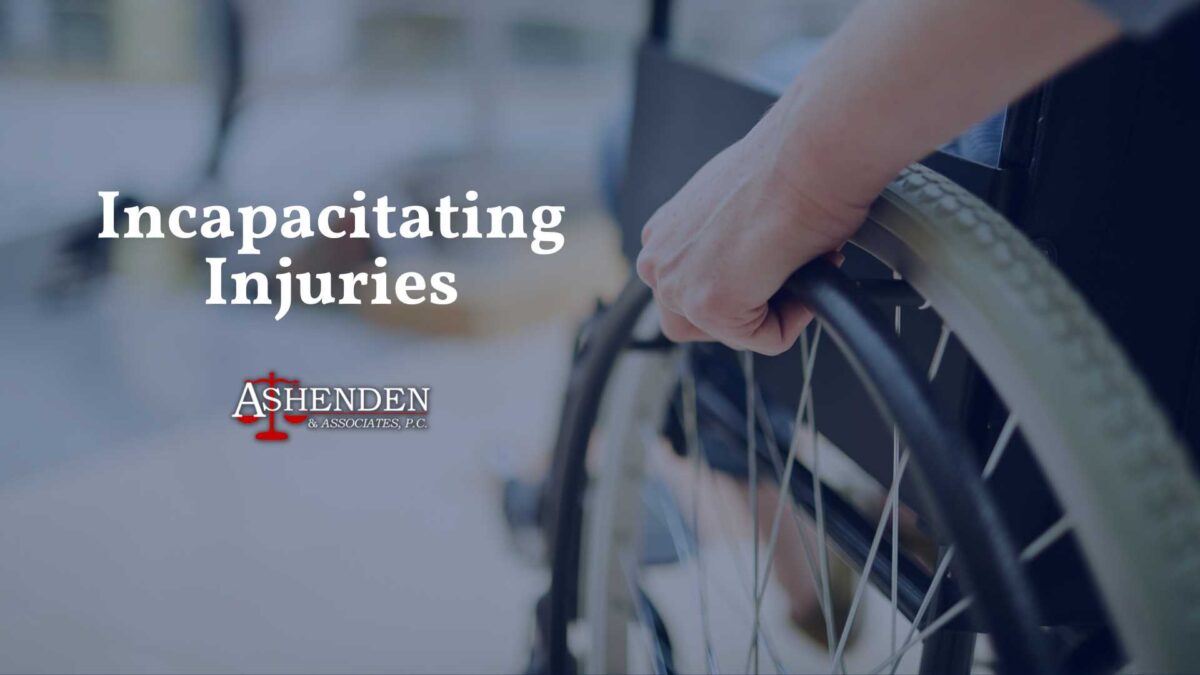Incapacitating injuries have the power to shatter lives, leaving individuals and families grappling with physical, emotional, and financial turmoil. For those who have suffered incapacitating injuries, recovery requires more than just physical rehabilitation – it demands comprehensive legal representation to secure your future well-being.
If an incapacitating injury occurred due to someone else’s negligence, you may be able to file a catastrophic injury lawsuit against the at-fault parties. Let Sandy Springs personal injury lawyers at Ashenden & Associates shoulder the legal burden while you focus on your recovery journey. Reach out today to schedule a free consultation. Call (770) 394-8909 or complete our online intake form.

Incapacitating Definition
An incapacitating injury refers to severe harm or trauma that significantly impairs an individual’s physical or mental capabilities, rendering them unable to carry out routine tasks or participate in daily activities. In the context of accidents, incapacitating injuries are those that result in a substantial loss of function, mobility, or cognitive abilities. These injuries often necessitate extensive medical treatment, rehabilitation, and long-term care to address the resulting disabilities or limitations.
Incapacitating injuries examples encompass a wide range of non-fatal injury conditions, including spinal cord injuries, traumatic brain injuries, broken or distorted limbs, and permanent disabilities. These painful injuries have profound and enduring impacts on an individual’s quality of life, employment, and well-being.
KABCO Scale
The KABCO scale is a classification system used to assess injury severity, particularly in the context of motor vehicle accidents.
It categorizes injuries based on five levels:
- K (Fatal)
- A (Incapacitating)
- B (Non-incapacitating)
- C (Possible Injury)
- O (No Injury).
Catastrophic injuries, such as severe head trauma or spinal cord damage, would typically fall under the K or A categories, indicating fatalities or injuries that significantly impair the individual’s ability to function. In contrast, minor injuries are categorized as B or C, signifying less severe harm that may still require medical attention but allows the individual to maintain some functionality.
The KABCO scale is valuable for emergency responders, medical professionals, and insurance adjusters, as it helps them accurately assess injury severity and allocate resources accordingly in the aftermath of motor vehicle accidents.

What is an Incapacitating Injury?
An incapacitating injury refers to a severe and often life-altering trauma that results in significant bodily harm, rendering the injured person unable to perform normal activities or tasks. These injuries encompass a range of severe conditions, including fatal injuries, traumatic brain injury, distorted or broken limbs, and chronic pain.
Typically occurring in situations like auto accidents, where the force of the motor vehicle crash leads to substantial damage, incapacitating injuries can prevent the injured person from walking, driving, or engaging in everyday functions. Emergency medical treatment is often required to stabilize the individual and address immediate concerns, such as head injuries or internal bleeding.
The consequences of an incapacitating injury extend beyond physical limitations. Such injuries necessitate long-term rehabilitation and care to mitigate their lasting effects and help the injured person regain some independence and functionality. Our Sandy Springs catastrophic injury attorneys can help.
Severe Injuries Examples
Examples of incapacitating injuries include:
- Neck injuries, such as fractures and cervical spine injuries, can lead to paralysis and are categorized as an ‘A’ on the KABCO injury scale. If you’ve sustained a paralytic injury, contact our Sandy Springs paralysis injury lawyers for a free consultation.
- Spinal cord injuries from car accidents, resulting in loss of motor function and sensation below the injury site, are often classified as ‘A’ or ‘B’ on the KABCO scale.
- Abdominal injuries or internal injuries that cause organ damage and necessitate emergency surgery, potentially resulting in permanent disability or chronic pain.
- Traumatic brain injury (TBI), leading to cognitive impairment and changes in behavior or personality.
- Broken or distorted limbs and fractures require surgical intervention and extensive rehabilitation.
- Severe cuts and lacerations can lead to significant blood loss and complications.
- Burns cause excruciating pain, scarring, and potential complications like infection and permanent disfigurement.
- Nerve damage resulting from trauma leads to loss of sensation, long-term pain, and impaired mobility.
- Chronic pain conditions, such as complex regional pain syndrome or fibromyalgia, cause persistent discomfort and limitations in daily activities.

Common Causes of Incapacitating Injuries
Incapacitating injuries can stem from a multitude of causes, extending beyond a motor vehicle accident.
The most common causes of accidents that lead to incapacitating injury include:
- Auto accidents
- Pedestrian accidents
- 18-wheeler accidents
- Motorcycle accidents
- Boat accidents
- Medical malpractice
- Nursing home falls
- Construction site mishaps
What is a Non-Incapacitating Injury?
A non-incapacitating injury, as classified by the KABCO scale, refers to harm sustained in an accident that does not result in significant impairment or disability. These injuries, while still requiring medical attention, do not prevent the accident victim from carrying out normal activities or tasks. For example, in a car accident, a non-incapacitating injury might include a minor neck injury, strains or sprains, as well as minor lacerations or bruises.
Despite being categorized under the same KABCO injury scale, non-incapacitating injuries differ from incapacitating injuries in their severity and impact on the victim’s daily life. While they may cause discomfort and inconvenience, non-incapacitating injuries typically do not result in long-term impairment or functional limitations.
Call our experienced Sandy Springs neck injury lawyers for a free consultation to see if you have a valid claim.

What is the Average Cost of a Non-Incapacitating Injury?
Determining the average cost of a non-incapacitating injury can vary significantly depending on the circumstances surrounding the incident, the severity of underlying injuries, and the level of medical treatment required. While a non-incapacitating injury may be considered minor, it can still result in expenses such as medical bills, lost wages, and potential property damage in cases like car accidents.
Even though these injuries do not typically lead to incapacitation, the costs can still accumulate, especially if the injury reported evolves into a possible injury over time. Thus, while non-incapacitating injuries may not result in sustained incapacitating injuries, they can still impose financial burdens on the injured individual.
What is a Possible Injury?
A possible injury refers to a situation where there is evidence of harm, but the extent or severity of the injury is not immediately clear. Unlike an incapacitating injury or evident injury, which are readily observable, possible injuries may include non-fatal injuries that require further medical evaluation to determine their full impact. For instance, in the aftermath of an accident, a person with a suspected serious injury may exhibit symptoms such as neck pain or discomfort, which could indicate underlying neck injuries.
Possible injuries may involve internal injuries that are not immediately visible but may manifest symptoms over time. Broken or distorted limbs could also be considered a possible injury if the severity of the damage is uncertain without further medical assessment. In such cases, prompt medical attention is needed to accurately diagnose and treat the injury.

Possible Injuries Examples
Possible injuries involve conditions that may not be readily apparent in the injured person, but require immediate emergency care and/or further assessment to determine their severity.
Examples include:
- Whiplash
- Internal injuries
- Minor head injuries,
- Limping
- Unconsciousness
KABCO Injury Scale Use in a Personal Injury Lawsuit
In a personal injury lawsuit, the KABCO scale serves as a key framework for evaluating the severity of damages sustained by the injured person. When injury victims wish to file a personal injury claim, they often hire a personal injury lawyer who utilizes the KABCO scale to categorize and document the injuries incurred. An incapacitating injury carries greater weight in personal injury claims, as they can lead to substantial damages for medical expenses, lost wages, and pain and suffering. Similarly, a suspected serious injury, or even a non-fatal injury may warrant compensation.
Whether the injury occurred in a car accident or another incident, understanding the severity of the injuries utilizing the KABCO scale strengthens the injured person’s position in negotiating or litigating their personal injury claim.
How Can a Severe Injury Attorney Help in a Catastrophic Injury Claim?
An attorney plays a vital role in assisting individuals who have sustained a severe or incapacitating injury and wish to file catastrophic injury claim due to someone else’s negligence, particularly in cases like a motor vehicle crash.
These attorneys are experienced in the legalities surrounding severe injuries, such as a crushed chest or other catastrophic trauma stemming from an accident. They provide invaluable support to their clients at every stage of the process, from the crash scene investigation to filing the catastrophic injury claim.
A Sandy Springs catastrophic injury lawyer can help incapacitating injury victims gather crucial evidence, calculate the damages associated with these injuries, and negotiate with insurance companies to ensure their clients receive just financial compensation.

Fatal Injury Claims in Sandy Springs
If a loved one has tragically suffered fatal injuries, dealing with the legal aftermath can feel overwhelming. In the event of a fatal crash or incident, filing a fatal injury claim becomes necessary to pursue justice and financial compensation for the loss endured.
At Ashenden & Associates, our compassionate Sandy Springs wrongful death lawyer team is here to provide support and legal representation during this challenging process.
Sandy Springs Incapacitating Injury Lawyer
If you or a loved one has suffered an incapacitating injury, let a Sandy Springs incapacitating injury lawyer protect your rights and recover the financial compensation you deserve. At Ashenden & Associates, our experienced team of personal injury lawyers understands the challenges you may be facing.
Whether you’re dealing with a minor injury or have suffered incapacitating injuries, we are here to provide compassionate support every step of the way. Call us today at (770) 394-8909 or complete the online intake form to schedule your free consultation.
